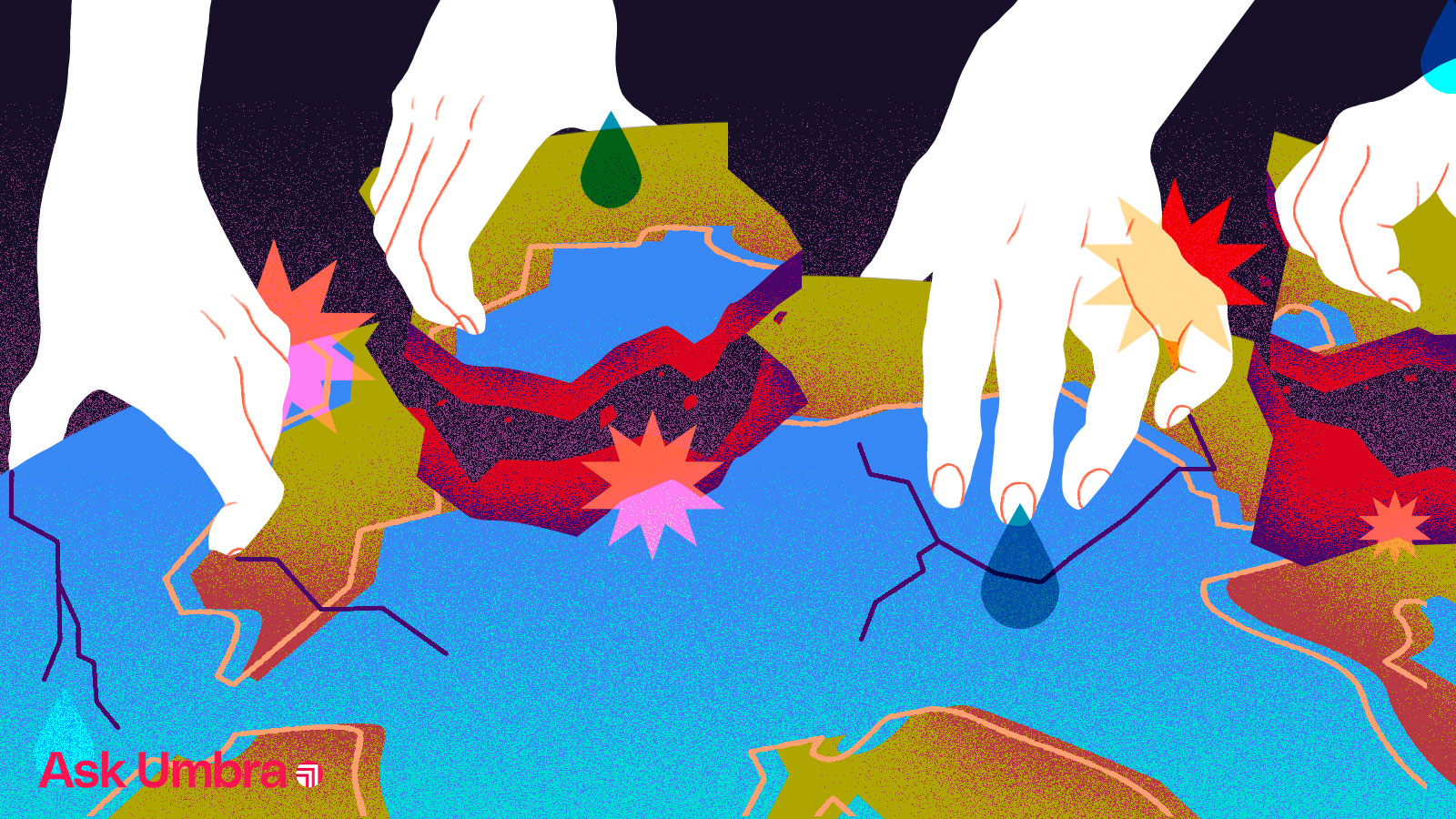Dear Umbra,
Are white people bad for the environment? Do white people have substantially higher carbon footprints than folks of color?
— Just Understanding Systemic Truths In Climate Emergency
Dear JUSTICE,
If you look at whose lives are most affected by the many harms of climate change, it’s clear that race matters. You can point to the disproportionate suffering experienced by the Black victims of Hurricane Katrina, the high proportion of Latino farmworkers who suffer from heatstroke or worse every year, or the number of Indigenous lands contaminated by fossil fuel infrastructure. Those examples are just in the United States, mind you, and not even a comprehensive list of wrongs! And the immediate question is: Since white people are relatively protected from climate change, does it imply that they are its main perpetrators?
The answer is complicated. White people are, of course, not a monolith. On one end of the spectrum you have your white mega-billionaires with spectacularly high carbon footprints both in terms of personal lifestyle and professional influence on consumption culture. At the other, you have the poor, white population of, say, parts of West Virginia, whose bodies and hometowns have been completely decimated by the fossil fuel industry. The gap between these two groups might lead an uncritical observer to exclaim, Aha! This proves race is just a proxy for class in this environmental equation!
Not exactly. Income certainly is an important predictor of one’s individual climate impact. It is a widely acknowledged and well-researched fact that the more money you have, the higher your carbon footprint tends to be. An analysis by Oxfam and the Stockholm Environment Institute found that those in the top 10 percent of the global income bracket are responsible for a whopping 46 percent of consumption-related emissions. And if you look at the breakdown of where the richest people live, about half reside in North America or European Union. A substantial portion of the rest is located in China and the Middle East. It turns out enormous wealth and extravagant consumption are not the exclusive provenances of those of European descent.
But I cannot emphasize this enough: The existence of wealthy non-white people is not a counterpoint to the fact that the climate crisis was strongly perpetuated by white, Western European ideas about dominance. (Nor is the existence of poor, white people who suffer because of our climate-destroying economic system.) Across social classes, the Western European ideal of “success” is based very much on extractive economies, materialism, and individualism — each a pillar of the climate crisis. When you consider this foundation, it is not a coincidence that almost all of those mega-billionaires are white.
The origins of global warming are “rooted in a racism of ‘I know better,’” said Anuradha Mittal, executive director of the Oakland Institute, a progressive think tank. That particular sense of entitlement is a key tenet of white supremacy.
Historically, Mittal explained, white people have long been so convinced of their own racial and cultural superiority that they completely ignore the harm they inflict on non-white populations and their natural resources in the name of “civilization.” There is no shortage of examples: the Industrial Revolution (its associated emissions are widely considered the original sin of climate change); colonization, an invention of white Western Europeans, which in addition to taking many Indigenous lives undid much of tribes’ stewardship of vital ecosystems; the American promise of “freedom” that was, in fact, built on the backs of enslaved people.
“The trade-off for this economic treadmill is you basically sacrifice those who are at the bottom and not part of the consumption patterns” that are driving climate change, said Robert Bullard, a sociologist and a founder of the environmental justice movement. “And those who have the keys to success, they are pushing the pollution back off on others.”
You can see that same system play out today in the way that communities of color continue to suffer the environmental consequences of the American consumerist lifestyle, often without enjoying its benefits. A recent study, for example, found that Asian, Black, and Hispanic Americans breathe more polluted air than white people do — which is by design. Highly polluted shipping warehouses, industrial facilities, and highways have all been systematically installed in non-white communities. And it is no secret that white-controlled governments have worked very hard to suppress votes from people of color to keep them from reshaping this system. In fact, many are still at it to this day!
The heart of your question, JUSTICE, is not whether every white person is bad for the planet. It’s about whether it’s possible to separate white people as individuals from the legacy that white-favoring systems have wrought on the world. And that is a very complicated prospect!
“It’s not that every white person walking around is like, ‘What am I going to do today to cause damage to Mother Earth?’” says Mittal. But that doesn’t mean that white people do not benefit every day from extractive and actively harmful systems erected by their ancestors, to the detriment of non-white neighbors. “It is a systemic responsibility of the so-called development created by colonizers that is behind the climate crisis.”
I’ve heard many ostensibly well-meaning white people try to distance themselves from that colonial legacy with some version of, “Well, it’s not like I was around for all that!” But Doreen Martinez, a sociologist and professor of Indigenous studies at Colorado State University, emphasizes that clinging to the separation between individual and system — in this case — misses the point.
“The biggest thing we have to push is our responsibility, more than where we can forgo that responsibility by making that separation,” she said.
On a personal note, I understand that this is a difficult concept to grapple with. My own ancestors came to the United States in the mid-1700s, colonized the North Carolina coast, owned slaves, and fought in the Civil War to protect their right to own slaves. They built a flawed nation for their own benefit, and I have had a privileged existence in it because that’s how they intended it. Even 250-odd years later, I understand that I have a responsibility to lend a hand in tearing down those unjust systems and constructing something more equitable in their place.
If you are a white person reading this, it’s important to realize there isn’t one right way to make up for the racial and environmental wrongs accumulated by one’s ancestors over time, but there are plenty of wrong directions. I have written so much about how to weigh one’s individual responsibility for the climate crisis amid great systemic dysfunction — it’s more or less the core issue of every Umbra column. And it’s clear that focusing on shrinking one’s own household emissions simply does not go far enough to address the harms inflicted by environmental racism.
If I buy an electric vehicle, go vegan, put solar panels on my house, and compost, will I have done enough to make up for that legacy and amend the climate crisis? Quite clearly not. And furthermore, the only reason that I would be able to afford all the trappings of a so-called low-carbon lifestyle would be because of the generational wealth obtained through the oppression of others and the extraction of natural resources.
It is not enough, as white people, to look at how to shrink our own carbon footprints — it has to happen alongside a restructuring of an economy that currently allows the white and wealthy to have outsized environmental impact while sickening and imperiling others. One potential solution is the idea of climate reparations, which can take many forms — they don’t have to be cash payments to members of impacted communities.
In an article for Foreign Policy, Georgetown University philosophers Olúfẹ́mi Táíwò and Beba Cibralic write, “Climate reparations are better understood as a systemic approach to redistributing resources and changing policies and institutions that have perpetuated harm.” For example, the two call for reforming the current international refugee housing system, calling upon wealthy countries to house migrants rather than denying them entry or relegating them to camps. They also suggest industrialized nations substantially increase their contributions to a Green Climate Fund that would help poorer, more frontline countries mitigate and adapt to climate change.
I’d like to leave you with this thought from Doreen Martinez that stuck with me, certainly in terms of my own lineage’s role in perpetuating the climate crisis: “What we need to address is the legacies that are lost — not individual families, but a way of being, a way of treating the land. It’s not just about bringing forth those histories and those injustices, but asking: ‘What did you change because of them?’”
Thoughtfully,
Umbra



